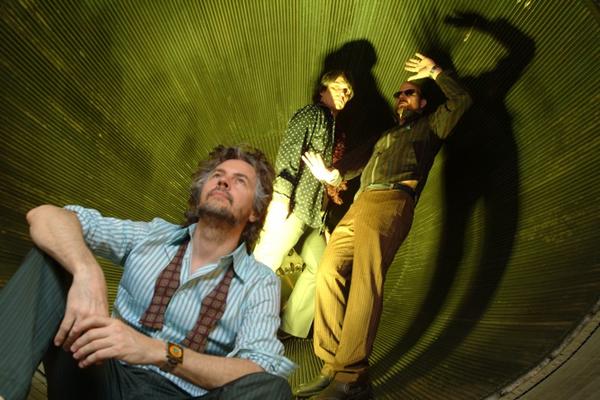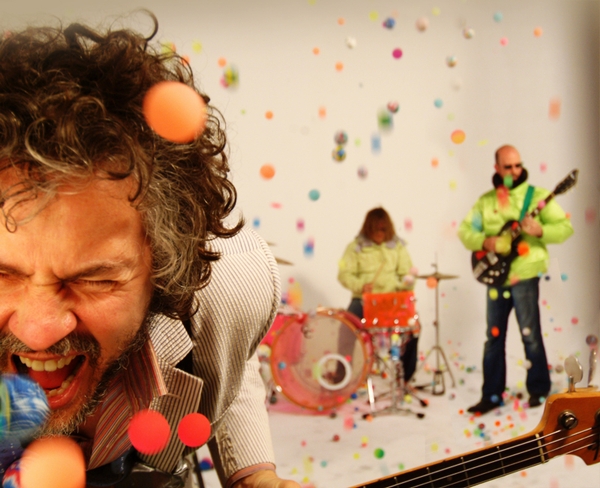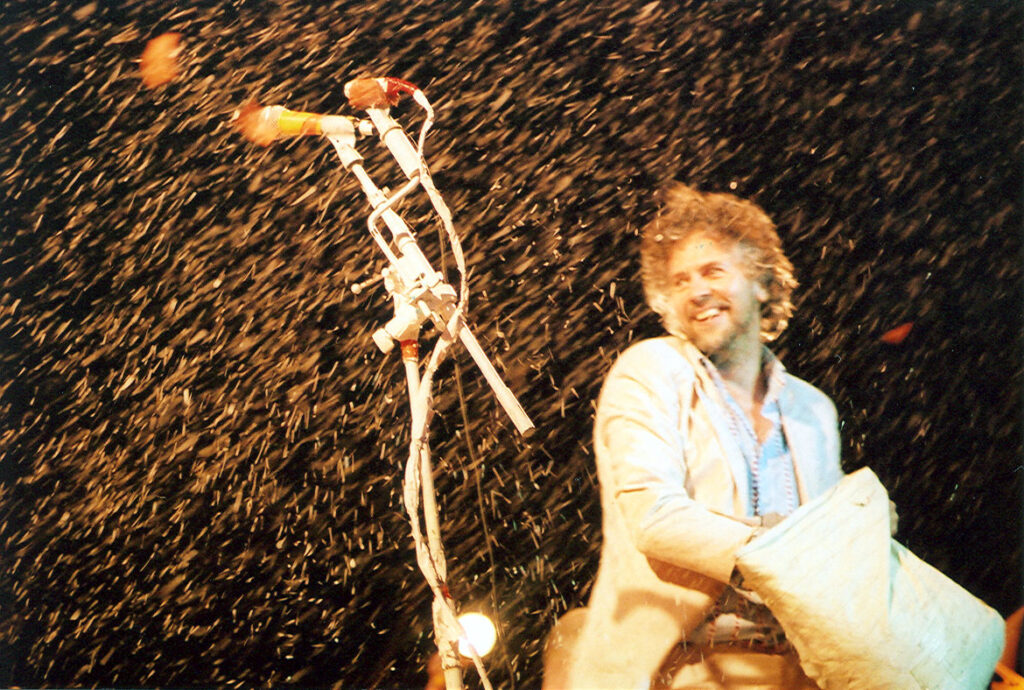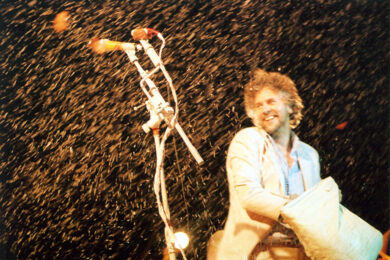People in the UK are often quick to compare Wayne Coyne to some kind of Dr Who figure. This is perhaps understandable given his shock of curly hair, his bohemian suits and the fact his natural environment seems to be the cosmic and unknown. Also one can’t help but feeling that his avuncular, slightly disorganized personality masks a deeper, more wise and sorrowful (and perhaps even occasionally slightly sinister) interior. If anything, however, the observation probably applies more to his group The Flaming Lips itself, in that they seem to regenerate themselves at regular intervals, thus keeping the ability to stay fresh while retaining some inalterable characteristics, no matter what they try.
When the band formed in Oklahoma City in 1983 they were ostensibly a drug powered garage rock tribute to the Butthole Surfers and were perhaps more notable for having revving performance bikes on stage with them as part of their set or nearly burning venues down with their crappy, home made pyro. By 1990 however (when their line-up featured Jonathan Donohue of Mercury Rev and long term bassist Michael Ivins) they were ready for a leap forward with In A Priest Driven Ambulance; the first sign that they were more than just a bunch of neo-hippy goofballs. While they would record other great albums in the 90s (most notably Clouds Taste Metallic and the notorious Zaireeka
album which consists of four CDs that need to be played
simultaneously) their trajectory remained fairly constant, if
spectacular.
But with The Soft Bulletin in 1999, it was as if they were preparing to enter the new decade with an entire new dimension added. This jaw-dropping concept album, ostensibly about scientists battling to find a cure for a global pandemic but really dealing with the transience of all life as we know it, was one of the best of the decade and finally broke them out of the underground to an international audience.
The last decade has been an imperial phase for them, taking some of the weirdest, most whacked out psych noise and fuzzed up bubblegum punk into relatively large venues, playing to a relatively mainstream audience. This has been helped along no end by a string of hit singles such as ‘Do You Realize???’, ‘Fight Test’ and ‘The Yeah Yeah Yeah Song’ and endorsements from Justin Timberlake, Jack White and most right thinking people in between.
How Steven Drozd took to the stage last night in Limehouse
But now they are back with Embryonic, which is another regeneration coming at the end of a decade. This double album of Krautrock, Black Sabbath, ELO and Miles Davis inspired jams that literally assaults the listener with use of compression that lies somewhere between ‘crisp’, ‘sparkling’ and ‘being stabbed in the ears with silver blades’. Again, this is one of their best albums to date and has effectively re-energized the band, who are old hands now. Whatever comparison you draw will be a false one in a lot of respects but purely in terms of length of service . . . at roughly this point in their career the Stones were releasing Steel Wheels, Metallica were on St Anger and even David Bowie was on Tonight.
Speaking to Wayne Coyne of the band hours before a triumphant
performance at London’s Art Deco Bingo Hall The Troxy, we learned a lot about laughing at death, celebrating life and the charming Karen O.
Right, the way that I see it is that you went into the 90s with In A Priest Driven Ambulance, which was a change of direction for you and then you went into this decade with The Soft Bulletin which was another change of direction. Now with the artwork and title of Embryonic, would it be fair to suggest that you’re going through another time of change, a notional rebirth preparing for the next decade?
Wayne Coyne: Well, I think in that sense Embryonic the title credits us with too much planning. It suggests that we actually know what we’re doing. To title it that must mean that we’re rebirthing ourselves here. But in a sense yes. We knew we were going to call it Embryonic before we wrote any of the music for it, so I think that title must have kept working on us or giving us the illusion that we were allowed to do this thing. Because some of it [new album] is utterly weird. And I think that myself. ‘Call that a song! That’s not a song! That’s just a weird, drone-y thing!’ I mean, those things are hard. When you’re sitting there faced with the idea of either writing songs, production and all these things – because we do everything ourselves – sometimes it can be weird thinking you’re just going to do a song which is a bassline and some strange words. But some of it we just liked it. The dilemma with a group like us is that when you start again, there’s a danger of saying ‘Hey, do you know what we used to be like? Well, we’re not about that any more. Fuck all that. That’s now meaningless. The only thing that matters is what we’re doing now.’ And that’s not ever going to be true. There are things on Zaireeka, The Soft Bulletin and even on Yoshimi . . . and At War With The Mystics that we would never want to say isn’t about us and I think that’s what happens to groups who have made 12 records or whatever and you end up thinking ‘All this stuff is us.’ And you can end up making the same record over and over. It’s like when you mix colours together. You mix red, blue and yellow together and you always end up with brown. You keep thinking you’re going to do all these things but it invokes the same intention.
I think with Embryonic there was the sense that we had ‘made stuff’. There was a sense that we had accidentally made something initially and that it would be cool to make a record with that kind of vibe to it. But we didn’t know how to. I mean we don’t really know how we got the vibe on other records. But we kept trying. And just experimenting with stuff. But I don’t think we ever thought ‘Oh, let’s destroy ourselves and start again.’ But I think we could now. But I wouldn’t want the audience to think we were going to do that. We get people every night coming up to us and talking about how much the song ‘Do You Realize???’ means to them and how they played it at their sister’s, or someone else’s funeral.
But there’s a massive disconnect between the spectacle of the live show with the celebration and the circus and the Flaming Lips on record who are very intense, psychedelic and heavy.
WC: Yeah. Well . . . the thing is, when we started doing The Soft Bulletin live it was a weird thing because it’s a group of songs about death. I’m not sure if everyone views it the same way but to me it as an album about death. Not just your own death but the death of everything. Everything around you is dying and the older you get the more everything is falling down and dying. And you either love that or hate that or embrace that or run away from that or whatever. I knew when we toured that album that we were going to be doing a lot of songs from that album back in 1999. And then we would be playing to 500 20-year-olds on a Saturday night who wanted to do ecstasy. They didn’t want to watch some old man singing ‘You’re gonna die! You’d better accept it and love it!’ And I know the difference because of age. When you’re younger death is just death and when you’re older death gives you insight into the nuances of living. Death and life reflect off each other. When you’re 20 the two things are separate. They don’t mix. Now I kind of knew that and I didn’t want to sit there on a Saturday night singing about how grim your life is going to be but it can be beautiful beyond that as well. So I just thought ‘Well, if we’re going to do that then we need to make this into an outrageous party like it was someone’s birthday. So that was our essential idea going into it, that it would seem like a very joyous thing with an underlying current of some kind of despair, some kind of realisation of what this is all about. That’s the concept. We can sing about death but we really have to sing about it as if we’re singing about life.
And we’ll do that in the context of this extravagant, exploding circus you know . . . But if all we did was confetti and balloons and stuff, I think after about five or six songs you’d be beat up. It’s like birthday cake. It’s great but you don’t want it all the time.

Like the guy who used to celebrate Christmas every day. He developed type 1 diabetes because he had Christmas cake and mince pies three times a day for 20-years.
WC: [laughing] Well, right! You want there to be other experiences. You want to have odd experiences. Even on the new album a track like ‘See The Leaves’ which is pretty bleak and brutal but I think it easily fits into the philosophy which I think most of the Flaming Lips audience understands. It’s not just about joy . . . I mean I talk to a lot of people after shows that really do have this other insight. I’ll talk to a lot of people whose parents are dead . . . there’s some connection to death that brings them into this celebration to say ‘I do know what life is about and it’s worth celebrating.’ So when I sing
songs like ‘Evil’ and ‘See The Leaves’ and all that I don’t think it’s a strange departure. You know, we’re doing this thing that feels like a celebration but all big rock things are. You can’t really have a big rock show and have it not be. Even watching a group like Radiohead there are bits where you’re going to go ‘Fuck. That’s pretty cool.’ If you’re on acid it’s going to be amazing. Do people still take acid here?
It’s quite hard to get acid here. But thanks to nature’s bounty we’re right in the middle of mushroom season.
WC: [laughing] I like it!
Talking about ‘Evil’ and ‘See The Leaves’ and other songs such as ‘Do You Realize???’ and the whole concept behind The Soft Bulletin; have your own near death experiences and Michael’s car accident and Steven’s calamitous heroin addiction fed into your ability to write these songs about mortality?
WC: I only had a near death experience perhaps, when I was really
young. When I was 17 and working in Long John Silver’s. And maybe
that’s what switched me so that I could speak about it or talk about it or write about it or sing about it in some way. I don’t know . . . you’re working at this dumb fast food restaurant and you come in all the time and you don’t think about it then one night these pissed off guys with giant guns just barge right into the back and yell ‘Motherfuckers! Get on the fucking floor!’ When you think about that when you’re 17 nothing prepares you for how it feels and you’re like ‘Oh yeah. This is how it really happens then.’ And they laid us on the floor . . . Yeah, there had been a lot of robberies in Oklahoma in the previous years where the staff had all been walked through to the back of the freezer and all shot through the back of the head. There were three guys from my street at these all night grocery stores who
had been shot. So yeah, it was a pretty desperate time in Oklahoma
City. So it was in your mind that you could get robbed and you could get killed. But you think ‘Fuck it, it won’t happen to me.’
So when these guys barged in I thought ‘Oh my God. This is happening to me.’ There’s a lot of time in that hyper ‘Fuck, I’m gonna die!’ state of mind, time slows down quite a bit and even though I was only on the floor for a couple of minutes, you just see – and it’s not your life flashing before you – you’re just sitting there thinking ‘This is it, I’m going to die now.’ And then when I didn’t die I just thought ‘I’m
going to do the things that I want to do and that I like to do.’ Not in some kind of selfish, it’s all about me sort of way. But I just felt no fear about pursuing my dumb life. Why not? If you fail, just try again – who cares? But without that kick . . .
The proximity of death had been a liberating thing?
WC: Yeah, totally.
What about seeing it from a different perspective? I mean the two things aren’t comparable on most levels but Michael’s car accident and Steven’s heroin addiction nearly saw your long-serving band members taken away from you?
WC: Well, when Steven was at the height of his heroin addiction . . . Look, I’ve been around drugs my whole life and I was born in 1961 so you can imagine what it was like going through the 60s and 70s. Those drugs all seemed like they were going to change the world and by the time you got to the 80s with people literally addicted to crack and crystal meth. You can see how it just defeats people. Steven started doing heroin in 1994 and it just escalates and escalates. And by the time we were doing The Soft Bulletin every single phone call I received I would think ‘That’s someone calling to say that Steven is dead.’ And you know that sincerely that you’re going to get that call. And even though I used to hang out with Steven all the time and it was
great and even at the worst of his addiction he was very charming and still a great musician. But there was this other life that he would disappear to. I think if anyone knows someone who is a heroin addict to the extent that he was then they will have experienced the same thing. And yet we’re moving straight ahead doing this music and this life together and yet there’s always this moment when you think you have no control over it and it is going to get as bad as it can get and yet we were still going forward. And I’d talk to people and they’d be like ‘How can you keep the band together knowing that Steven is going to die? Why don’t you just stop the whole thing.’ And unless you’ve experienced it you just don’t know, because you just can’t stop
your life for eight years and wait until you deal with your addiction or you die and then we’ll pick up the pieces. You just can’t. You move on. Life is like that. It’s all going on at the same time. Every time he wasn’t with me I would think ‘There’s going to be some drug deal that goes wrong or he’s going to get an infection that’s going to kill him or there’s going to be some overdose that’s going to kill him or he’s going to be put in jail. You live with a bunch of these scenarios that are some source of motivation. You end up saying ‘He is here now, so let’s make music now.’ Instead of saying ‘Ah, I’m tired. Fuck it.
We’ll make music next week.’ You say ‘I’m tired but he may be dead next week so let’s make music now.’ And that sounds like I may be overdramatising things but it’s the truth. And then you get these little insights.
With Michael’s accident you think ‘Oh my! I hadn’t even considered Michael!’ [laughs] Some kind of catastrophe is awaiting us somewhere but you’re so concentrated on one that you end up being surprised: ‘Oh my God! That’s volatile too!’ And I think that puts you in a state of mind to think about things. I think that’s all you do. You sing about things that are on your mind. And I feel that’s what you should do otherwise you’re contriving to sing about stuff and you can’t do that really. You’re singing one song and you really want to be singing another. You really just sing about what’s going on in your life.
Now, I’m a really big fan of the new album. And one of the first things I noticed about it, within three seconds of pressing play on it, in some respects it sounds like it was mastered by a maniac – and this is with reference to The Flaming Lips’ already overcompressed drum sound. But this use of loudness is obviously not to make singles sound loud on the radio like, say, Metallica and U2 use compression purely to sound loud in the marketplace. Do you use compression in the same way that a dub reggae producer uses echo?
WC: Sure, yeah. All of that stuff is the same thing. An instrument
doesn’t really have a sound. It has what sound you give it. If you take some Beatles records and analyse them they’re just a pile of distortion. You think ‘Oh my God what’s gone wrong here?’ Or if you’re me you go ‘Oh wow! That’s cool. Who is doing that?’ Do drums really sound like that? Well, they do . . . in some situations. If you’re standing next to a drummer and he’s playing really loud. On a scientific level your ears really do distort. It’s a motherfucker. But then if you record that with a microphone and it’s not overpowering you it doesn’t sound like that. So I think there’s an element to our sound that is like being overpowered. It sounds like it’s too much for you. I don’t know, I just guess there’s an intrinsic intensity to
that kind of distortion that I’m damaged by and that I’m attracted to.
I can’t seem to get by without it. There aren’t many records that I like that aren’t like that. I know now why I like that but I didn’t know earlier in my life. When you can pick and choose between something sounding like a bunch of racket and something having a very clean sound and you can choose I’ll always go for the thing that has more . . . I don’t know . . . has more fire. More dirt.

It also demands that you pay attention. Whether you’re lying on the couch or standing up or whatever, it kind of means you can’t read a book at the same time. And it’s not really designed for an iPod is it?
WC: Oh, I don’t know. I don’t know. To me putting on your headphones when you’re on the plane is something I do a lot. Where you are isn’t as important as your state of mind is. Whether it’s coming out of big speakers or coming out of headphones or whatever. Double records . . . I never listen to double records at once. That’s why we decided to say a double record. Listen to half of it go and do something and then
listen to the other side later. That’s even if people listen to sides any more. I know I do but a lot of people are like ‘I’m gonna listen to this and that song.’
What about Karen O? Which of her animal noises are you most happy with?
WC: It’s not the animal noises I think but her laughing which sets the tone for the whole thing. We did the track ‘Watching The Planets’ and she’s on there but she’s just a particle in a cloud of sound with all of us singing. But after this session I was quite happy with the way that she had been singing. And she said that line ‘Can we do a less civilized version of that?’ And I said ‘Yeah, whatever you want to do is fine by us.’ And she did this five minute thing where every five seconds she would find this new weird thing to be. But she was constantly laughing which makes everything instantly better. We did this over the phone and as she was doing it I was thinking ‘Oh, this is too good, I need to turn this into something else.’ So I told her
and she was like ‘You can do whatever you want with it.’ So I made the song ‘I Can Be A Frog’ from that, having heard her on the phone. It has the spirit of her going for it. She didn’t know what she was going to do but the tape was rolling and she just went . . . [makes insane noise] She would do it and then crack up.
It’s a very charming song.
WC: It is and it begins with her laughing and that sets the tone, even though she’s not really reacting to what I’m saying because her bit has already been recorded. And her bit is making me laugh.



